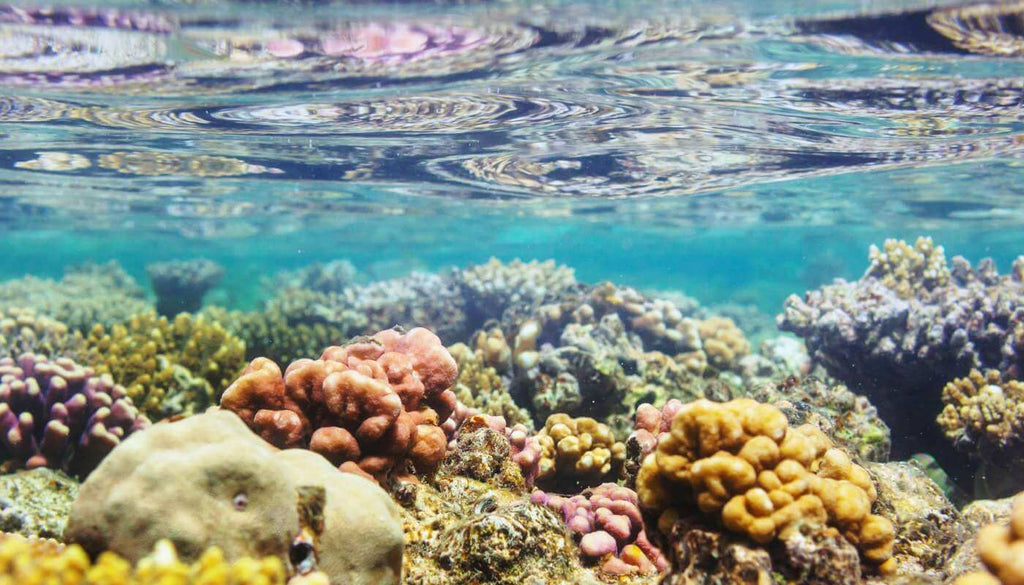
Oxybenzone: The Sunscreen Ingredient that's Killing our Coral
There's been some articles in the news recently about the sunscreen ingredient oxybenzone. Marine scientists from Virginia, Florida, Israel, the US National Aquarium and the US National Oceanic and Atmospheric Administration have recently completed a study that shows that oxybenzone is causing massive damage to coral reefs.

Oxybenzone is an active ingredient used in sunscreens as a chemical absorber to absorb UV rays and protect you from getting sunburnt. It's also used in lipstick and other cosmetics including nail polish and even shampoo. People put sunscreen on before going swimming or snorkelling at the beach. Some of it comes off, and ends up in the water. Or you shower when you get home, washing that oxybenzone-laden sunscreen down the drain, where it ends up in the ocean via wastewater streams.
The study found that oxybenzone is an endocrine disruptor. It changes the DNA in baby coral, causing gross deformities. It causes coral to encase itself in its own skeleton, leading to death. The study also found that the larger the concentration of oxybenzone in the water, the greater the rate of coral bleaching. Just a small amount of oxybenzone in the water can cause coral damage. Scientists estimate that the equivalent of just one drop of water in six Olympic sized swimming pools is enough to cause damage. It’s estimated that between 6,000 and 14,000 tonnes of sunscreen end up in the world’s oceans each year. How much of that contains oxybenzone? Clearly, the answer is ‘too much’.
If oxybenzone is damaging coral, what’s it doing to people?
Oxybenzone is considered safe by the FDA, but as of April 2015, the amount of oxybenzone permitted in sunscreen products in the US has been reduced to no more than 6%. It seems that even the FDA is becoming concerned about the safety of the ingredient. The TGA, in contrast, permits concentrations of up to 10%. That's a lot of oxybenzone getting into our oceans.
EWG Skindeep Database scores oxybenzone as a moderate hazard ingredient at 4. It's considered likely to be an allergen or irritant in humans, as well as being suspected of being an endocrine disruptor, to accumulate in people's bodies, and is also suspected of causing developmental toxicity. It appears that it's worth avoiding oxybenzone not only for the health of the world's coral reefs, but for your own health as well.
How do you avoid oxybenzone?
Manufacturers of sunscreen products don't have to disclose their ingredients, as they're considered to be commercially sensitive. But they do have to disclose their active ingredients. So read the back of the pack, check out the active ingredients, and if you see oxybenzone on there, move on to another product. Oxybenzone is also known as benzophone-3 or BP3, so keep an eye out for those names, too.
If you're going snorkelling on a coral reef, consider wearing one of those full body stinger suits. They're like a rash vest, but a full length one. They'll stop you getting stung by jellyfish, but they'll also stop you getting burnt and you only need to apply sunscreen to the parts of your body that are visible - hands, feet, neck and face.
We don't recommend that you skip the sunscreen this summer. In fact, we highly recommend that you use it, along with hats, sunglasses, getting some shade and wearing protective clothing. But there are better choices of sunscreen that are healthier for you and for the planet. Look for products that contact zinc oxide or titanium dioxide as their active ingredients, as these don't appear to harm coral reefs. They're also better for people. There's more to skincare than just the effect that it has on your skin. Many ingredients have a detrimental effect on the environment, too.
Choose your sunscreen wisely this summer, and go with a reef friendly sunscreen free from oxybenzone. None of the sunscreens we stock at Hello Charlie contain oxybenzone, so check out our range of natural sunscreens if you're looking for something this summer and if you're new to Hello Charlie, don't forget to check out our Sunscreen Cheat Sheet for a complete rundown of all the best natural sunscreens available in Australia.





